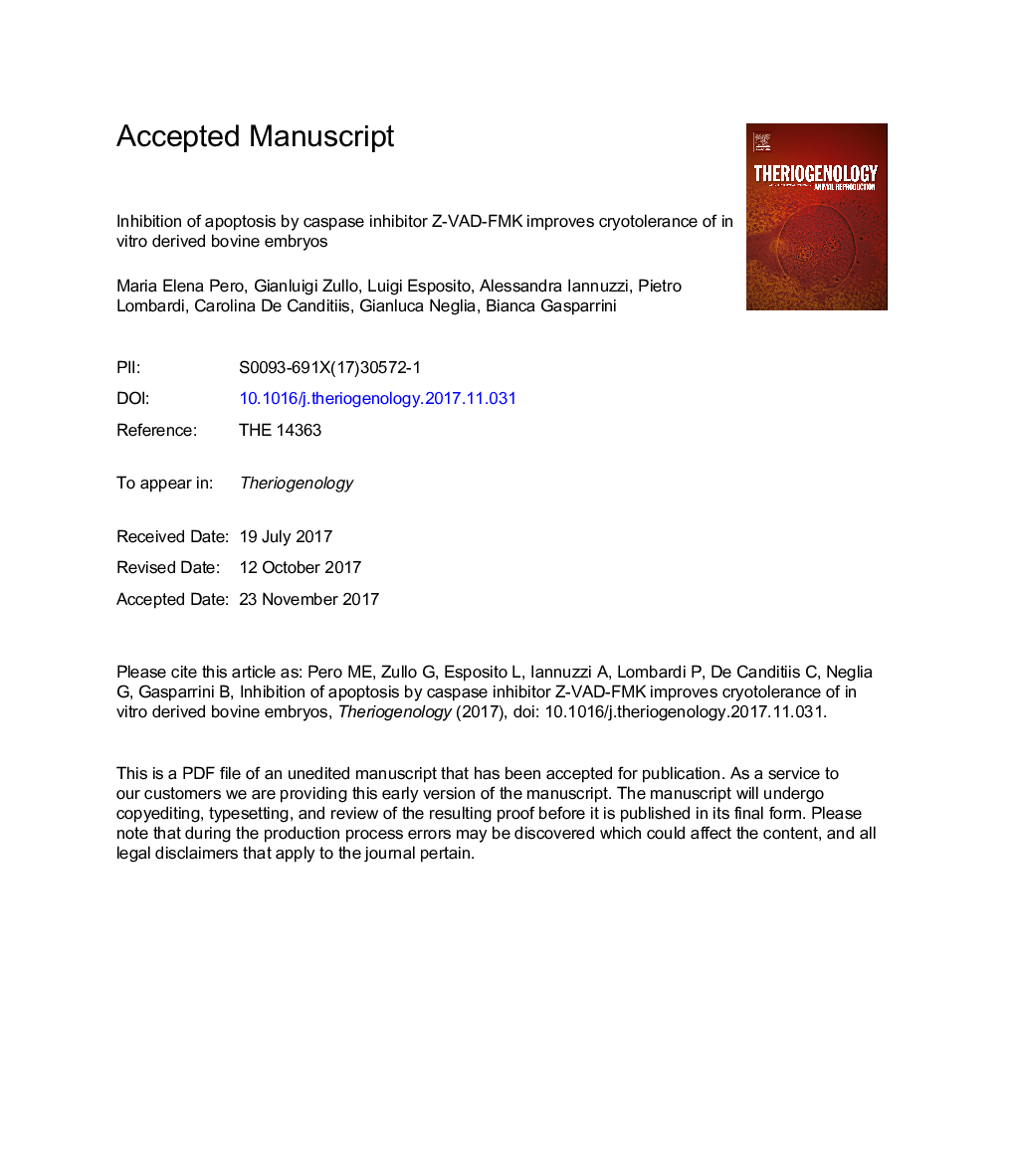| Article ID | Journal | Published Year | Pages | File Type |
|---|---|---|---|---|
| 8427658 | Theriogenology | 2018 | 32 Pages |
Abstract
The aim of this work was to evaluate whether the treatment with the pan-caspase inhibitor benzyloxycarbonyl-Val-Ala-Asp-fluoromethyl ketone (Z-VAD-FMK) during cryopreservation and post-warming in vitro culture improves cryotolerance of bovine in vitro produced (IVP) embryos. Abattoir derived bovine oocytes were in vitro matured, fertilized and cultured according to standard procedure. On Day 7, embryo yields were assessed and blastocysts randomly divided in 2 groups: vitrification and post-warming culture in the absence (n = 184) or presence (n = 156) of 20 μM Z-VAD-FMK. Resistance to cryopreservation was evaluated post-warming culture by assessing the survival rate and hatching rate. Differential staining combined with in situ terminal deoxynucleotidyl transferase mediated dUTP nick end labelling (TUNEL) technique was performed to evaluate total cells number, cell allocation into inner cell mass (ICM) and trophectoderm (TE) lineages, as well as the DNA fragmentation rate of vitrified blastocysts, while immunohystochemical staining was used to assess the level of cleaved-caspase 3. It was demonstrated that inhibition of caspase activity by Z-VAD-FMK increases embryo cryotolerance, as indicated by higher survival (76.1 vs 51.1%; P < 0.01) and hatching rates (26.5 vs 17.6%; P < 0.05) after 48 h of post-warming culture. Furthermore, Z-VAD-FMK decreased both the average number (4.7 ± 0.3 vs 7.7 ± 0.5; P < 0.01) and the percentage (3.4 ± 0.2 vs 6.1 ± 0.5; P < 0.01) of DNA fragmented cells in blastocysts compared to the control. No differences were recorded in the average number of ICM, TE and total cells between groups. The level of cleaved-caspase-3, the downstream effector of apoptosis, and its relative percentage on total area of blastocysts was reduced (P < 0.01) in the presence of Z-VAD-FMK both at thawing (1.29 ± 0.17 vs 3.24 ± 0.46) and after 48 h post-warming culture (1.46 ± 0.17 vs 5.06 ± 0.41). In conclusion, the addition of 20 μM Z-VAD-FMK during vitrification/warming and post-warming culture partially inhibits cryopreservation-induced apoptosis by reducing the level of active caspase 3, suggesting a potential use as an additive to ameliorate the efficiency of embryo cryopreservation in cattle, critical for a further diffusion of IVEP technology in the field. Further studies are though needed to evaluate the effect of Z-VAD-FMK on post-transfer embryo development before considering a commercial application.
Related Topics
Life Sciences
Agricultural and Biological Sciences
Animal Science and Zoology
Authors
Maria Elena Pero, Gianluigi Zullo, Luigi Esposito, Alessandra Iannuzzi, Pietro Lombardi, Carolina De Canditiis, Gianluca Neglia, Bianca Gasparrini,
